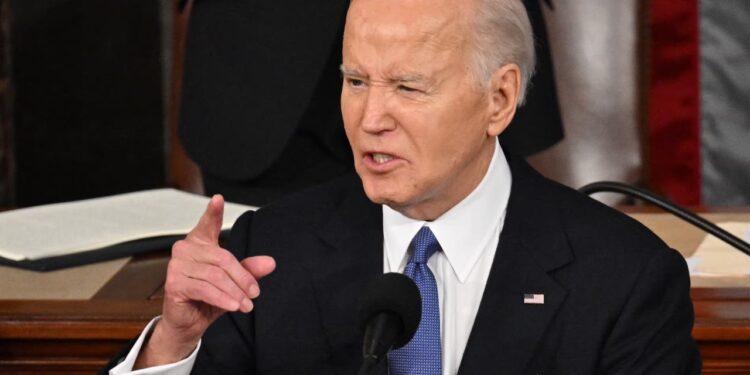US president and allied officials fear ‘significant’ strike within days in retaliation for Israeli bombing of consular building in Damascus
Joe Biden has vowed that US commitment to defend Israel against Iran was “ironclad” as concerns rose in Washington that a “significant” Iranian strike could happen within days, in retaliation for the bombing of an Iranian consular building in Damascus.
US and allied officials fear that a strike is imminent and could come in the form of a direct missile launch from Iran, rather than an attack through a proxy like Hezbollah in Lebanon. Israel has vowed to respond in kind to such a direct strike, raising the prospect of a regional war, which US officials now believe is more likely than at any point since the beginning of the Gaza conflict on 7 October.
Biden’s pledge of support to Israel at the White House, intended as a deterrent, came a few hours after Iran’s supreme leader, Ayatollah Ali Khamenei, repeated a threat to strike back against Israel over the Damascus bombing that killed 12 people, including Gen Mohammad Reza Zahedi, a senior figure in Iran’s Islamic Revolutionary Guard Corps, and six other guard members.
“When they attacked our consulate area, it was like they attacked our territory,” Khamenei said, in remarks broadcast by Iranian state TV. “The evil regime must be punished, and it will be punished.”
Israel’s foreign minister, Israel Katz, responded in a post on the X social media platform, vowing that: “If Iran attacks from its territory, Israel will respond and attack in Iran.”
Israel has not formally taken responsibility for the 1 April bombing, but Israeli and US officials have made clear it carried out the strike.
Israel and Iran have been trading blows in Lebanon and Syria for months, but Biden administration officials fear that the 1 April Damascus bombing on an Iranian diplomatic building, which Tehran considers its own territory, has significantly raised the threat of the Gaza war widening into a broader conflict.
Since the Damascus bombing, Tehran has sent Washington messages attributing ultimate blame for the attack on the US and warning the US to stay out of its confrontation with Israel.
Biden’s pledge to Israel on the White House lawn, in a joint appearance with the Japanese prime minister, Fumio Kishida, appeared to be a response to that warning, insisting the US would not stay on the sidelines.
“We also want to address the Iranian threat to launch a significant – they’re threatening to launch a significant attack in Israel,” Biden said. “As I told Prime Minister Netanyahu, our commitment to Israel’s security against these threats from Iran and its proxies is ironclad. Let me say it again, ironclad. We’re gonna do all we can to protect Israel’s security.”
The Biden administration is seeking to head off a direct Iranian attack by messaging that Tehran cannot assume that US forces in the region, reinforced significantly since the start of the Gaza war, would stay out of a conflict with Israel.
“We’ve been clear that we do not want this conflict to escalate or spread further in the region. We’ll continue to undertake diplomatic efforts to ensure that remains the case,” the spokesperson said. “We also retain a military presence in the region to deter those who seek to take advantage of the conflict.”
Secretary of state Antony Blinken reiterated that message on Wednesday in a call with Israeli defence minister Yoav Gallant, in which he made clear the US would stand with Israel against any threats by Iran, the State Department said.
Alon Pinkas, a former Israeli diplomat and adviser to Prime Ministers Ehud Barak and Shimon Peres, said: “The prevailing conventional wisdom is that because the attack in Damascus was directly against Iran, then that means that Iran will have to respond to retaliate directly, rather than via a proxy.
“From what I’m hearing here, the most telling sign is that Khamenei has mentioned the need to retaliate twice in the last week in his sermons or whatever,” Pinkas said. “Usually, they don’t do that. Usually, they are much more opaque and only commit to a response one day at the right moment and in the right place.”
Among the possible targets are Israeli embassies around the world, and they have been taking extra security precautions in the wake of the Damascus bombing, but US officials also believe that a direct strike on military or government targets on Israeli territory is also a significant possibility.
The US and Israeli militaries and intelligence agencies are in constant contact about the threat. Axios reported that the head of US Central Command, Gen Erik Kurilla, is due in Israel on Thursday to discuss coordination with his Israeli counterparts and the defence minister, Yoav Gallant.
The ability of the Biden administration to rein in an Israeli response to an Iranian attack would very much depend on the specifics. If Iranian retaliation comes in the form of an assault on an Israeli embassy, or if an incoming Iranian missile or drone is intercepted, it may be possible to prevent escalation, officials said, but if an Iranian strike caused multiple casualties inside Israel, it would be very much harder.
Source: The Guardian











Recent Comments